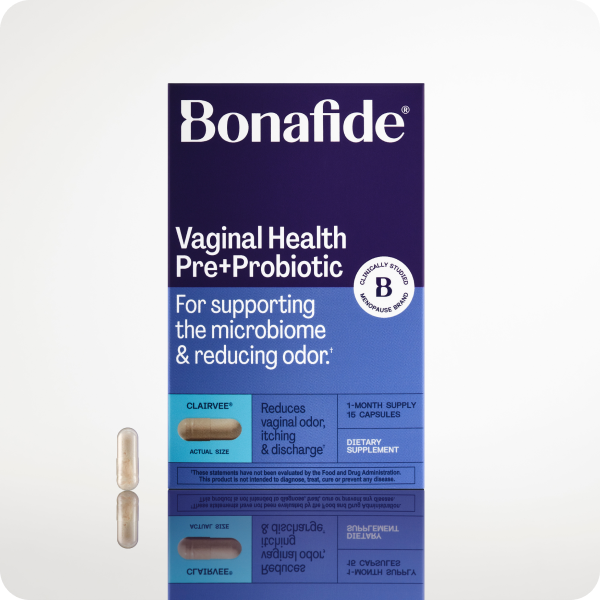Want to print this article for later? Click here.
Chances are you've heard how the right foods can benefit your heart health, brain health, or skin. As it turns out, what you eat can also have an impact on your vaginal health. So, what should you eat for vaginal health? Read on to learn more.
Adjusting Your Diet for Vaginal Health
A diet rich in wholesome, minimally processed foods can help to support your body as a whole. "The Mediterranean diet, often recommended as a heart-healthy diet, is also a perfect example of a whole-foods, rich diet beneficial for vaginal health and the menopausal time of life, generally," says Bonafide Chief Medical Officer, Dr. Alyssa Dweck.
This pattern of eating helps to optimize blood pressure and blood flow, including blood flow to the vagina, Dr. Dweck explains. This optimization of blood flow can help promote adequate vaginal lubrication and play a role in managing menopausal symptoms like dryness, itching, or painful sex.
So, how should you alter your diet for vaginal health? "Lean proteins, plentiful fresh fruits and vegetables, limited salt, olive oil instead of butter, and limited red meat are hallmarks of a healthy dietary regimen," Dr. Dweck says. What's more, science suggests that certain foods may be particularly effective in helping to maintain a healthy vagina. Here are six of the best foods for vaginal health to consider adding to your diet, along with one thing that's potentially worth limiting to better support your vaginal health.
Yogurt for Vaginal Health
Fermented dairy foods like yogurt (along with kefir and some cheeses) contain probiotic bacteria including lactobacilli strains,1 which may help support a healthy vaginal microbiome and play an important role in promoting vaginal health.2,3 "Lactobacilli produce lactic acid and hydrogen peroxide to maintain a normal acidic vaginal pH. Disruptors to this pH balance are common and include both exogenous hormones and hormonal change, menstruation, sex, and some hygiene products," Dr. Dweck says.
You'll reap the biggest benefits by choosing plain, unsweetened yogurt made without added sugars. "Excess sugar intake may also alter the microbiome, which can lead to infection and symptoms such as itching, irritation, or discharge," explains Dr. Dweck. If you're looking for a little sweetness, try flavoring your yogurt with fresh fruit instead. If you’re not a fan of yogurts or fermented foods, dietary supplements containing lactobacilli may also provide similar benefits, when used as directed.
Barley
Whole grains like barley are rich in prebiotics,4 beneficial fibers that work in tandem with probiotics to enable them to do their job.5 "Prebiotics further support a healthy vaginal microbiome by maintaining probiotic viability during digestion and maintaining a biofilm, an important part of the vagina’s natural defense mechanism," says Dr. Dweck.
Barley isn't the only source of prebiotics, though. You can also get your fill of these super fibers from oats,6 wheat bran,7 bananas, onions, garlic, leeks, asparagus, beans, and artichokes.8
Unsweetened Cranberry Juice Drink for Vaginal Health
Research suggests that daily cranberry juice consumption could help reduce the risk for recurrent UTIs,9 which can become more common in menopause. Cranberries are rich in proanthocyanins or PACs, natural phytonutrients and antioxidants that may make it harder for harmful bacteria like E. Coli to stick to the bladder wall.10 "If bacteria cannot adhere to the urinary tract, infection is less likely," Dr. Dweck says.
If you're not a juice fan, a concentrated cranberry supplement can be a good alternative. In fact, it might even be better. "While cranberry juices are readily available, most contain added sugar, and surely a much lower concentration of PACs than a concentrated supplement," says Dr. Dweck.
Salmon
Omega-3 fatty acids found in fatty fish like salmon can help to promote skin hydration and reduce vaginal dryness.11 Women who get more omega-3 fatty acids in their diet experience fewer vaginal menopausal symptoms including dryness, itching, and discomfort, one study found.12 Salmon is also rich in vitamin D, another nutrient linked to decreased vaginal dryness.13
Soy-Rich Foods May Increase Female Lubrication
Minimally processed soy foods like tofu, tempeh, and edamame contain phytoestrogens, estrogen-like compounds that can mimic the effect of the hormone. While increasing your intake can be controversial (and experts don't yet know the ideal dose), there's evidence to suggest that a soy-rich diet may help improve symptoms of vaginal dryness,14 as well as other menopause symptoms like hot flashes.15 Because soy products may impact your hormone levels, it’s important to speak with your healthcare provider first to determine whether increasing soy intake is right for you.
Drink Water to Support Vaginal Health
H2O plays an important role in keeping your vaginal tissues lubricated, which can reduce itching and discomfort. "Dehydration can lead to vaginal and vulva dryness as these mucosal membranes need adequate moisture to stay supple and hydrated," Dr. Dweck says. Drinking eight glasses a day is a good goal, but experts agree that it's also okay to use your thirst as a guide.16
Foods to Limit to Support Your Vaginal Health
There are plenty of good reasons to limit added sugar in your diet, from supporting heart health to aiding in weight control. Moderating your sugar intake matters for vaginal health too. In addition to having a negative impact on the vaginal microbiome and exacerbating symptoms like dryness or irritation, excessive sugar consumption could also increase the risk for yeast infections in women who are prone to them, says Dr. Dweck.
There's no need to swear off the sweet stuff completely. Just pay attention to how much sugar you're getting from foods throughout the day – the American Heart Association recommends limiting your intake to 6 teaspoons or 25 grams daily17 – and save sugary snacks or desserts for special occasions.
Resources
- https://www.eatright.org/food/vitamins-and-supplements/nutrient-rich-foods/prebiotics-and-probiotics-creating-a-healthier-you
- https://www.ncbi.nlm.nih.gov/pmc/articles/PMC6134985/
- https://pubmed.ncbi.nlm.nih.gov/26142892/
- https://www.ncbi.nlm.nih.gov/pmc/articles/PMC3958897/
- https://www.eatright.org/food/vitamins-and-supplements/nutrient-rich-foods/prebiotics-and-probiotics-creating-a-healthier-you
- https://pubmed.ncbi.nlm.nih.gov/26511097/
- https://www.cambridge.org/core/journals/british-journal-of-nutrition/article/effects-of-a-wheat-bran-extract-containing-arabinoxylan-oligosaccharides-on-gastrointestinal-health-parameters-in-healthy-adult-human-volunteers-a-doubleblind-randomised-placebocontrolled-crossover-trial/0D6E9686908ADF1E38EFD63B03C14451
- https://www.eatright.org/food/vitamins-and-supplements/nutrient-rich-foods/prebiotics-and-probiotics-creating-a-healthier-you
- https://academic.oup.com/ajcn/article/103/6/1434/4569625
- https://health.clevelandclinic.org/can-cranberry-juice-stop-uti/
- https://www.healthline.com/nutrition/vitamins-to-increase-female-lubrication#5.-Fish-oil
- https://www.tandfonline.com/doi/full/10.1080/13697137.2018.1547700
- https://www.ncbi.nlm.nih.gov/pmc/articles/PMC4387645/
- https://medlineplus.gov/ency/article/002142.htm
- https://jamanetwork.com/journals/jama/fullarticle/2529629
- https://www.mayoclinic.org/healthy-lifestyle/nutrition-and-healthy-eating/in-depth/water/art-20044256
- https://www.heart.org/en/healthy-living/healthy-eating/eat-smart/sugar/how-much-sugar-is-too-much










Comments
Post commentThese comments is unbelievable not knowing what you’re going through makes it harder now that I know what to use and what not to use it. Helps so much thank you.
Thank you for the helpful information. I really appreciate it. Being beyond menopause, we need extra help keeping everything healthy as possible!
Yes, I find your articles very educational. I am a 68 yrs young Black Woman who suffers with dehydration, I am also celebrate. I need all the information and help I can get. Thank You fir yiur knowledge, care abd concern.
Thank you for the knowledge especially the list of good foods for our “PEACHY”
Thank you so much for your help and information on Hotflashes and dryness Vaginal problem. I suffer so much on HOTFLASHES AND VAGINAL DRYNESS FOR 11 YEARS!! I’ve been going through menopause for 11 years and still having issues with Hotflashes .